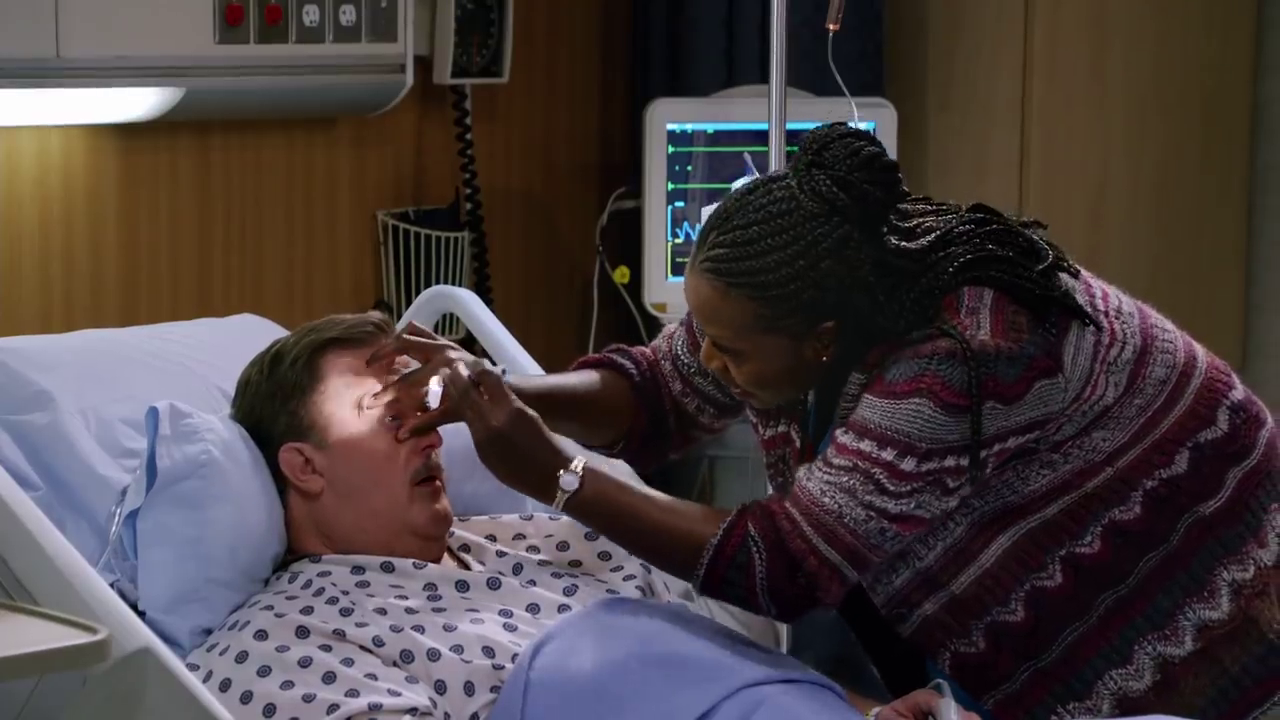There is a genre of jokes dedicated to Yorùbá women and it is not hard to come by these days. The jokes branch out into sub-genres suited to the different social situations within the Yorùbá women demography. There is enough slander to distribute between spinsters, rich aunts, married women, single mothers and immigrants. The consensus is that these women are a paradoxical combination of the beautiful and difficult. And no matter the direction of the joke, the moral lesson, so to speak, is the same: Fear Yorùbá women. The sitcom, Bob Hearts Abishola, which premiered in September 2019, mines Yorùbá women slander for content.
Bob Hearts Abishola is helmed by a 4-person team, including Chuck Lorre of The Big Bang Theory fame and British Nigerian stand-up comedian Gina Yashere as the only black woman among them. It is not hard to imagine Chuck Lorre wandering into the Nigerian corner of the internet and having a good laugh at the expense of Yorùbá women, then deciding it is good sitcom content. The show opens quite seriously, with a cardiac arrest. The titular Bob is rushed into a hospital and his profile is quickly gotten out of the way: a 50-year-old white businessman with a heart disease and a problematic family. Even with the grimness of the situation, a fart joke manages to slip into the scene, an implicit reminder that this is more of a sitcom with a joke built into every act than some serious auteurial piece.
If Bob, played charmingly by Billy Gardell, is the show’s emotional anchor, his co-star, Folake Olowofoyeku’s Abishola, is its hard core. Her entry is as Nigerian as it gets, her first two lines of dialogue being “Ehn” and “Ehn ehn”, in response to Bob’s corny comments about her beauty. She is savage from then on, the stereotypical no-nonsense Yorùbá woman. But Bob hasn’t met one before so here he is falling in love with who he should be fearing.
A self-conscious series, Bob Hearts Abishola is aware of the pitfall of its genre–inappropriate jokes–and works to avoid them. But with the drama of a fat white man and his black single mom love interest as the plot engine, it fails occasionally. While Abishola’s friends and family–an aunt and uncle played with gusto by Shola Adewusi and Barry Shabaka Henley respectively–are excited about Abishola’s new prospects of love, Bob’s family are a little skeptical. This caution may seem good-hearted but it is only a few steps away from being racist. In the first season’s third episode, Bob’s younger brother who can’t tell the location of Nigeria, the most populous black country in the world, tells him, “It will never work. … A bird may love a fish but where will they make a home together?” A well-intentioned fake deep perhaps, but then the scene closes out with a joke about dating a Jewish girl in recovery. That appears okay until you begin to wonder what extra layer of humour the girl in recovery being “Jewish” tacks on.
Where Abishola’s side is the go-to for uproarious theatrics, the weakest link in the show is Bob’s family. His mother, Christine Ebersole’s Dottie, is a racist woman strenuously disguised as a mere grinch; his brother, Matt L. Jones’ Douglas, a slouch; and his sister, Maribeth Monroe’s Christina, a socialist without the attendant self-awareness that comes with the political ideology. They all have their moments, of course, but for the most part they exist to stay out of the way of the actual story while delivering boring fat jokes and other flat acts. More consequential to the series are the side characters of Tony Okungbowa and Bayo Akinfemi who give us refreshing subtitled gossip in Yoruba and “Ghanaians are the Canadians of Africa.”
For a sitcom, Bob Hearts Abishola takes itself seriously and it should. Its centering of the first generation immigrant experience and Yorùbá culture makes it groundbreaking after all. It could have quite easily sunk into the pretentious trap of race activism like white TV shows are prone to, modelling the white man into some sort of saviour, never mind that he is unable to tackle the dysfunction in his own immediate family. Instead, it rises above its occasional blunder and shows a rudimentary understanding of intersectionality: how multiple social categories, including gender and class, combine to disadvantage a people. There are a few shots at privilege and capitalism too, to a good extent for a non-critical, predominantly white, capitalist medium, even while shipping a romantic union.
That Bob and Abishola will end up together is never in question. What, with the giveaway title, the flawlessness of their characters and everyone rooting for them? The challenge is for how long they could be kept apart before the courtship trope wears out and starts begging for retirement. Yet, 2 seasons and 30 episodes into the show, the writers still seem able to keep the ship afloat. Bob Hearts Abishola may have its issues but it is entertaining and deserving of attention in a world we have started to think of as post-race.
Adams Adeosun is a writer with work in places like Transition, Catapult and The Offing.
